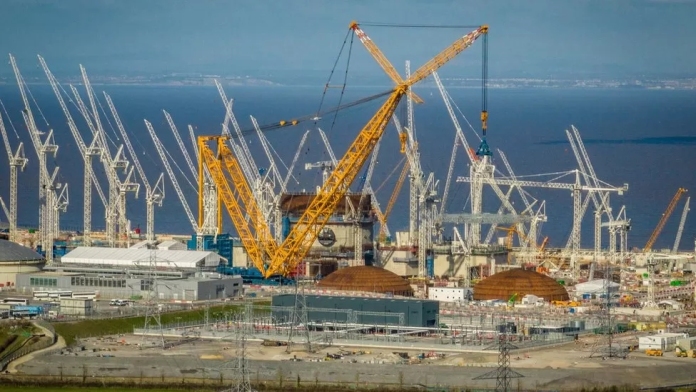EDF says the opening date for Hinkley Point C nuclear power station looks set to be delayed by a further three years as the cost of building it could soar by about a third.
The energy company said on Tuesday (January 23rd) that it now estimates the final cost could hit £46bn, when taking price rises into account.
It adds that the completion date is likely to be 2029 or 2030.
Local concern has immediately been raised in Brean that the news may mean Pontins delays its re-opening as a holiday park in order to keep accommodating 900 Hinkley Point workers there. The Pontins closure has been blamed by Brean tourism businesses for a downturn in their trade.
An EDF spokesman says: “A review of the Hinkley Point C project has been finalised and has led to the following re-evaluation of the schedule and costs.”
“The aim of the project is to bring Unit 1 into service around the end of the decade. Several scenarios have been analysed.”
“The first scenario around which the project is organised is targeting becoming operational in 2029. This schedule is based on a target productivity for the electromechanical work, which action plans are being drawn up to achieve.”
“A second scenario – the base case – which assumes certain risks inherent in the ramp-up of the electromechanical work and the testing schedule do materialise, would see Unit 1 operational in 2030.”
“Finally, given the complexity of the project, an unfavourable scenario assuming a further 12-month risk materialises could lead to Unit 1 being operational in 2031.”
Once Hinkley C is complete, it is expected to generate enough electricity to supply some six million homes, for 60 years.
The French state-owned firm manages all five nuclear power stations that are currently generating electricity in the UK, along with three that are defueling, the first stage of winding down operations.
In 2022, the cost of the UK’s first new nuclear plant since the 1990s was estimated at £26bn, with a target date for completion of June 2027.
Previous cost estimates have been expressed in 2015 prices for easy comparison over time. But taking inflation into account, the previous estimate on final costs of £26bn works out at £34bn today. The updated estimate of £31-35bn, could see costs hit £46bn in today’s prices – an increase of about a third.
In a letter to staff, Stuart Crooks, the managing director of Hinkley Point C, says there have been 7,000 substantial design changes required by British regulations which have needed to be made to the site, with 35% more steel and 25% more concrete needed than originally planned.
The project has also faced severe delays because of supply chains being hit during the pandemic, as well as labour shortages.
“Going first to restart the nuclear construction industry in Britain after a 20-year pause has been hard,” Mr Crooks wrote.
“Like other major infrastructure projects, we have found civil construction slower than we hoped and faced inflation, labour and material shortages, on top of Covid and Brexit disruption,” he added.
He pointed out, however, that UK bill payers will not be directly affected by those building and cost time overruns.
The French firm EDF agreed to shoulder the risk and pay the full cost of construction, including any increases. This was in return for an agreed electricity price that was substantially higher than the average price in 2015 and would only rise in line with inflation.
“It is important to say that British consumers or taxpayers won’t pay a penny, with the increased costs met entirely by shareholders,” Mr Crooks’ letter read.
A spokesperson for the Department for Energy Security and Net Zero said: “We’ve ended the stop-start approach to nuclear and recently launched a roadmap setting out the biggest expansion of nuclear in 70 years, simplifying regulation and shortening the process for building new power stations – meaning cleaner, cheaper and more secure energy in the long-term.”
In reaction to the updated Hinkley Point C construction schedule, Tom Greatrex, Chief Executive of the Nuclear Industry Association, said: “The more nuclear stations we build the quicker and cheaper it will become, so instead of building one plant at a time with long gaps in between projects, a programmatic approach, as outlined in the government’s Nuclear Roadmap, is vital to ensure we build expertise, maintain workforce capability and increase efficiency.”
“Hinkley Point C is the most significant green energy project ever in the UK and represents the revival of an industry after a generation of not building any new plants. It has revitalised the supply chain, creating thousands of skilled jobs in the process and will provide vital learnings for the rest of the industry.”
“Hinkley Point C is an integral part of the UK’s route to energy security and decarbonisation, and will continue to provide firm, clean power and jobs well into the second half of this century and beyond. What is important now is that we act with pace and scale alongside other clean energy technologies as we shift towards a net zero future.”







